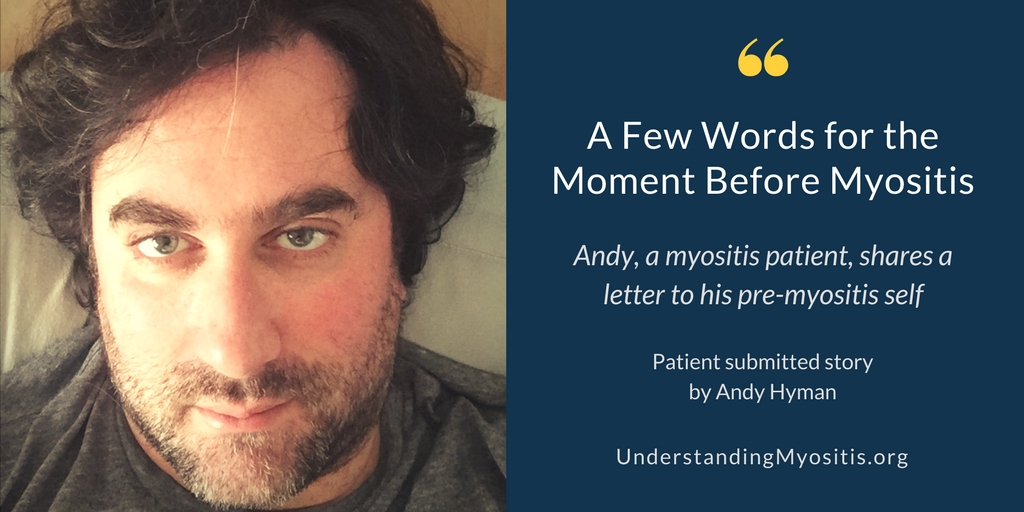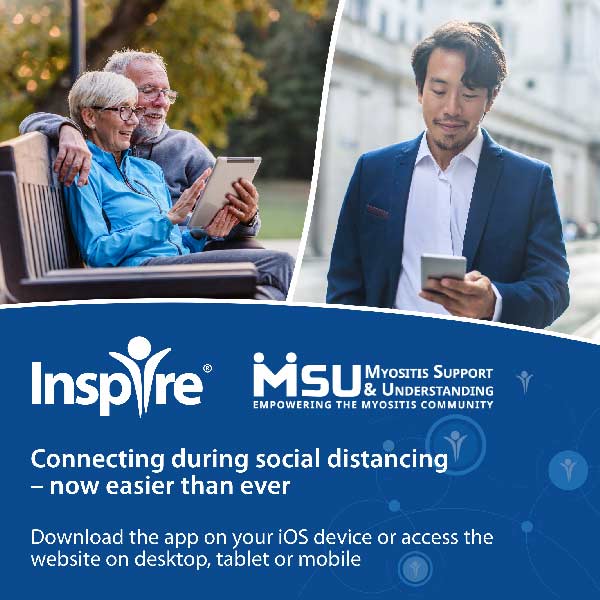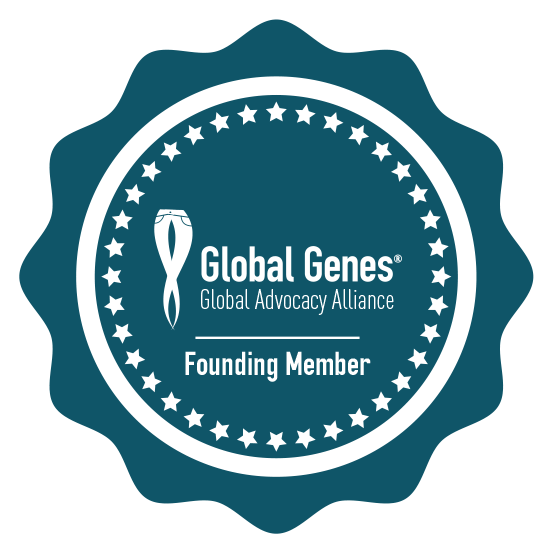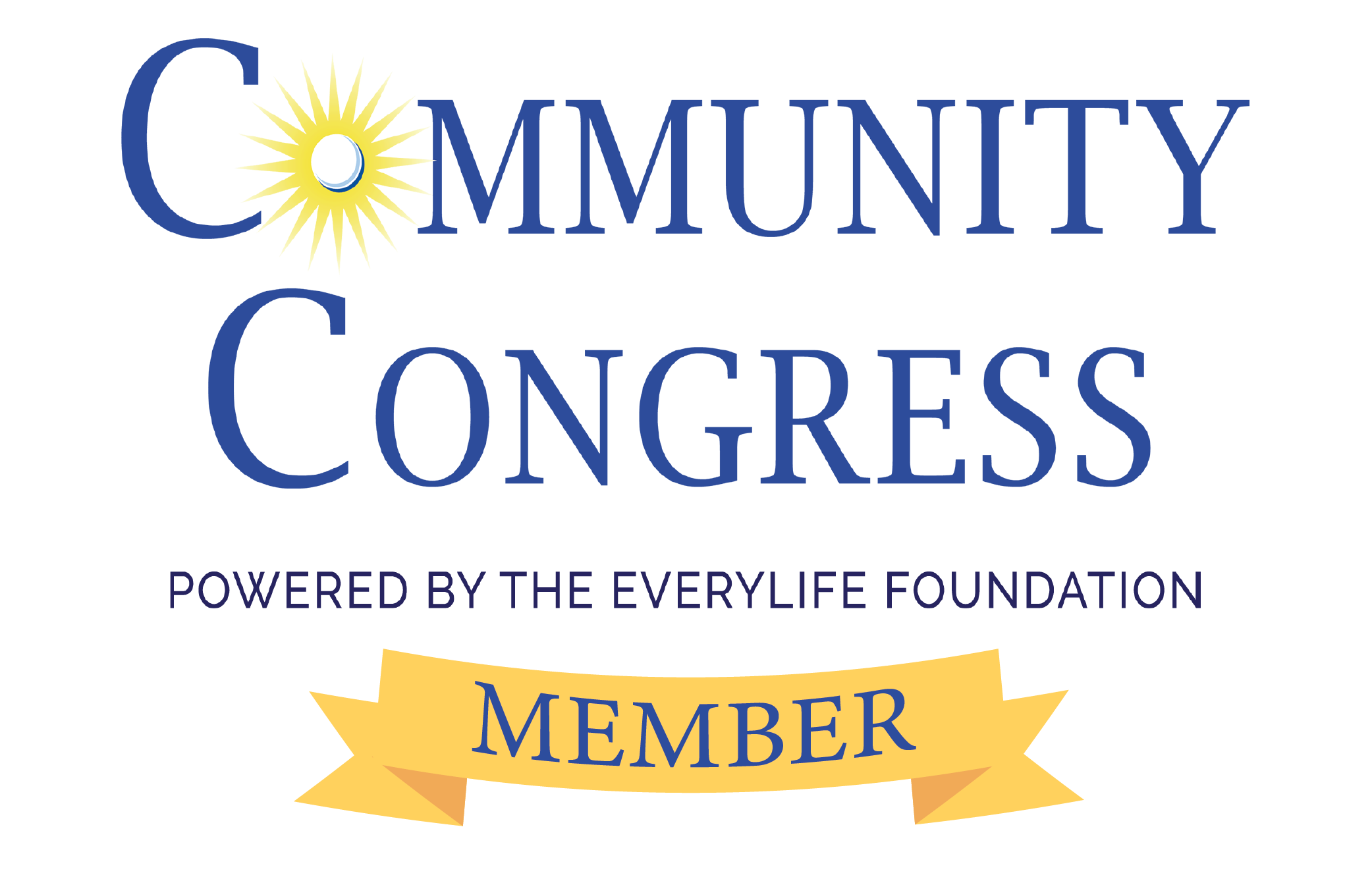Myositis Awareness Month got me thinking…and really, reflecting about a time, before my initial flare-up almost three years ago, when Myositis wasn’t at the forefront of my consciousness—a notion that seems so foreign to me now. I think back to the first time I heard the word “Dermatomyositis”, and actually, it’s a moment I remember very clearly.
I was standing in the hallway of a dermatologist’s office, after weeks of shuttling between appointments with different specialists, when the doctor—who had just gotten off the phone with my rheumatologist—kind of casually said, “Oh, by the way, have you ever heard of Dermatomyositis?” I told her I hadn’t. “Don’t worry, it’s a long, scary-sounding word, and you’ll probably never hear it again, but…”
But, I continued to hear that word.
As it so happened, there would be days, weeks, where it seemed like that word was all I would hear. Months of medications, IVIG, bandaged hands and purple face, and so forth—you guys all know the drill. Months and months where it seemed like the ‘D’ word would define me to degrees to which nothing had ever defined me before.
But what I find myself thinking about now, for the first time, in any detail, is who I was at that moment in the doctor’s office, just before the word “Dermatomyositis” barged its way into my awareness for the first time—how much younger, how much less-informed, how different that guy was from the me that exists today…and what I wish I could tell him that might make the coming journey a little easier.
In honor of Myositis Awareness Month, I figured I’d write a letter to that version of Andy standing there in the doctor’s office, completely unaware of what’s to come. (And while I know this is late, since May was Myositis Awareness month, let’s not forget that since I have Myositis, sometimes I don’t make May until the end of June.)
Dear Andy,
Congratulations! You’re about to get real, real messed up. What’s coming is going to be unlike anything you’ve ever experienced before — certainly anything you had made a plan for . . . but, as your future self, having gone through the looking glass and finally finding myself on the mend (at least for now), I’m here to help. So, here are a few pieces of advice; some will come easy, some hard, and some you’ll ignore altogether, at your own peril—though, that’s kind of how growing up works, I guess.
1. It’s time to get honest, with yourself and others, at a fundamental level.
Hmmm…while perhaps the most important, this is also the one that you’re gonna struggle with more than anything else. Maybe we better come back to this later.
2. Learn to ask for (and accept) help.
This one’s not gonna be a walk in the park either. The fact of the matter is, you’ve just turned 33, and you’re coming off a life without major medical issues and a pretty steady supply of energy, with no understanding why those conditions have both changed so dramatically in recent months or how to conceive of a life with their permanent absence. Add to this a fairly unhealthy mixture of arrogance, determination, pride, the belief that you need to “be a man and not trouble other people with your business,” or however you want to put it, and it’s a dangerous recipe for someone who thinks he’s going to proceed through this whole thing still running the show on his terms. In fact—though it may seem silly now—you’re going to tell people very close to you, “I don’t trust any of you,” on more than one occasion; that’s how much you’re going to cling to the idea that you have to be in charge all the time. So let me say this very carefully: you won’t be able to do this on your own. Start to acquaint yourself with the prospect of trusting the people with whom you’ve chosen to share your life—and who’ve chosen to share theirs back—since you will not get healthy without letting them be in the driver’s seat from time to time. And, while they won’t always be perfect—no one is—you’ll find they’ll come through for you in ways you never imagined. So let them help you. In fact, you won’t always be able to determine when you need help, and when you don’t, so ask for help asking for help. Which is especially important, since…
3. Your ability to communicate is going to suffer.
I know you’ve always fancied yourself some kind of mental Titan, but this illusion is about to be shattered once and for all. You’re going to get slower, foggier, and more frustrated. Your panic response will be triggered by the slightest thing having to do with your messed-up hands or your weak legs. And when people ask what’s wrong, you will struggle to tell them. You, who’s never had too much of a problem talking about yourself, will be at a loss for words more often than not. You won’t be able to explain why you’re always late (because your concept of time has been thrown completely out of whack) or why you lose your wallet and/or keys every day (no matter how big of a point you make to put them in a certain place, when you check, they’re somehow not there anymore), or a hundred other things that used to be effortless, and are now anything but. So, acknowledging the trouble is very real—and not your fault—start to take small steps to adapt. Your memory’s always been such where you never had to write anything down—but that’s not the case anymore. Your symptoms will come and go with what seems like such haphazardness, so take notes, because otherwise you’re going to get to the doctor, he’ll ask for an update, and you’ll find yourself at a loss to give him one. Every fever you get—and there will be lots—take a picture of the thermometer, so you have an ongoing record of their frequency and severity. Insomnia is going to be a big part of this fight—from the itching and pain of the skin symptoms, the constant night sweats, and the general sense of dread that’ll seep into your existence—and that will make it even more difficult to talk to people in the harsh light of day. And finally, as hard as this all may be, try to hold yourself in some degree of compassion, and understand that you’re a sick person and if you don’t live up to whatever expectations you might’ve had before all this started, it’s the expectations that are the problem, not you. Because…
4. You do belong, and have every right to live happily, in this world.
Oh man, I know you’re already believing the opposite of this to be true—you’ve been believing it for months, as you watched whatever functionality you have continue to wither. And you’re going to learn soon enough that it’s a common predicament of the autoimmune disease sufferer, especially pre-diagnosis—the notion that you are somehow not cut out for functional adult life in this world, that you’re somehow inferior, or incompetent. There will be a moment one morning, not long from now, where you will suddenly not be able to figure out how to turn off the water in the shower—no matter which way you turn the knobs, nothing seems to work. After your girlfriend comes to the rescue (and she will come to the rescue again and again in the next few years) and gets you out of the shower, you will stand in front of the mirror and tell your reflection that you’re an idiot, pathetic, a real piece of $%*#. It isn’t true. You have a lot of learning to do, a lot of adjusting ahead of you, but in no way does that mean that you don’t belong here. You have inherent value as a person that can’t be created and can’t be destroyed, by a disease or anything else, so don’t let your frustration persuade you that there isn’t a place for you and a happy life ahead. But in order to seek it out…
5. You are going to need a healthy, industrial-strength emotional management system.
Numbing yourself to the world isn’t going to be an option; neither will so many of the things you adopted early on as ways of dealing with pain in your life—cavalier self-destruction, being a jerk to people, not sleeping, working too much, working too little, abusing drugs and alcohol, just generally telling the world to go %^&# itself in every word and gesture, which isn’t to say that you’re not going to try them all, perhaps with greater enthusiasm than ever before. But you’re going to find, now coupled with this whole new disease, that they’re gonna lead you down a darker path than you’d like. And you know what? It’ll be one of the best things that ever happened to you, because it’s going to open your eyes to the reality you’re facing: that coping emotionally is something that, moving forward, you’ll have to actively participate in, while seeking out a system that will work for you. Exercise, meditation, prayer—things you’ve snickered at for years—are going to become your friends. For god’s sake, get yourself into therapy, with someone you can really open up to, someone who has a background in working with the chronically ill, and PTSD sufferers, because frankly, what we go through with these diseases is pretty damn traumatic. And when you can, when you have the time, when you’re physically capable—shock yourself by doing some kind of volunteer or service work (it’s going to make a huge difference when you can finally make it happen, because as you’ll discover, the more you’re thinking about others, the less you’ll be obsessing about yourself). The point is, what you’re going to be thinking and feeling is perfectly natural—but it doesn’t mean that you’ll be exempt from designing a way of processing it that benefits you and those around in the long term. Which is why…
6. You have to get honest with yourself and others, at a fundamental level.
Andy, you’ve struggled with this in some form or another you’re entire life—but pay very close attention, because this is going to make or break you. You do not have to keep telling people (and telling yourself) that you’re okay when you’re not okay. You do not have to keep insisting that you’re not scared. I can look back at you now, deep into the very core that you refuse to acknowledge even exists, and say, that you are in fact quite scared. You know how I know? Because I’m still scared today. Scared of a new kind of normal. Scared of a life that, in this disease, I keep telling myself will be devoid of joy, that will just be about surviving, and nothing else—even though that’s proven to be dead wrong on a regular basis. Scared of what it means when it hurts to stand up, or when I get yet another low-grade fever, even if they happen every couple of months now, instead of weekly, like they used to. Scared you will never do the kind of work you used to do—the work that was once such a part of your identity—since you don’t ever have the energy or focus for it, scared that you can’t conceive how you ever could have had the energy or focus for it. Scared of what it means that you have had to cancel so many plans, turn so many things down that most of the people you know have just stopped inviting you altogether. Scared that your relationships will never recover from the hit they’ve taken. Scared of being someone who doesn’t see the truth, or appreciates what he has when he’s been blessed with so much. You are going to want to lie your way out of all of this; to put a band-aid on it, and hope it resolves itself before anyone has to know the truth. But know that there’s no need for you to do this. As counterintuitive as it sounds, you’ll need to be vulnerable in order to survive. So practice telling yourself, and others, the truth. Say—even if only to yourself—that sometimes you’re okay, other times you’re not. Be willing to acknowledge that you’re a person living in turmoil, in conflict, and that it’s not really the person who you want to be, but it’s the person who you are. Learn that you can’t continue to pretend you’re someone who’s needless, and wantless—because your needs and wants are going to keep you alive, healthy and connected, and if you’ve got to get comfortable asserting them, standing up for them, then so be it. And be prepared to grow in ways you never, ever expected—like I said before, this is going to be a growing-up experience for you, a trial by fire and a right of passage unlike any you’ve ever experienced. The Me talking to you now is a very different person—and, for all the nostalgia I may have for the good ole days, I’m blessed and fortunate to have had the chance to come this far on that road. Just remember, when things get tough, you’re worth not giving up on. And when things seem dire, give yourself that compassion you deserve, however hard that may be, and however difficult you’ve found it in the past. Because, after all…
7. If nothing changes, nothing changes.
If you want things to get better, you’re going to have to grow as a person—no matter how many times you may have said that that’s “not really your thing”…it’s going to be an interesting road. I look forward to meeting you when you get here.
by Andy Hyman











Dear Andy Thank you.
I have had polymyositis/dermatomyositis for 5 years and so many of your words resonate with me. I cried uncontrollably when I read it. The ups and downs, feeling the disease defines me , meds, IVIG, complications etc
Unfortunately I don’t have a myositis support group where I live and have a hard time doing things online, but today I did and read your letter
My Dr said “I would be fine in 3-4 months” which many people are, I guess. I fall in the group that does not respond so well. When I went to the ER because I could not breath well I was labeled with “anxiety disorder”
If I had read your letter a long time ago it would have helped me so much.There are so many symptoms, besides the muscle problems that Drs did not tell me about, and when I told them they dismissed them so I thought I was crazy Particularly the difficulty with memory and concentration.(and the night sweats!!) I forget entire conversations and have a hard time reading .I used to have an almost photographic memory I thought I might be developing dementia. I describe it as “The Fog” and my ability to cope goes up and down with it. I have minimized my symptoms to others because I am afraid they will get bored with me, and because it helps me be in denial.You have opened my eyes to this
Mainly the difficulty in accepting that this is here to stay and that ups and downs come with it. The hardest part is I always get disappointed when I improve and then slide bak, the darn uncertainty of it seems to have me paralyzed. But you define it so well :I live in turmoil and conflict and that is who I am now. I have adapted as best I can ,in the practical sense but the emotional one I realize reading your letter is far behind because I get angry every time I slide back . I see myself as weak when in fact when I read your letter and realize what I have survived I should be proud not ashamed Thank you so much for sharing
Andy,
I cried when I read your article. I too was diagnosed 3 years ago (with polymyositis), mine came from a neurosurgeon giving me the results of my muscle biopsy. I thought the appointment was just to check the wound, so I told my husband to go to Jury duty that day instead of being by my side as he had through the previous 6 months of tests.
You see the original diagnosis I had been given was ALS/Lou Gehrig’s, so instead of being upset, I was thrilled to hear it was only “Poly”. I knew that was a cakewalk comparatively and I was grateful. As a result I have been in “denial” about how debilitating this condition is (and in my case, getting progressively worse). Your piece gave me the courage to accept the severity of this rare disease and the inspiration to work harder at finding the resources I need to cope with it both physically and emotionally. Thank you for so adroitly articulating your feelings but most of all for your honesty.